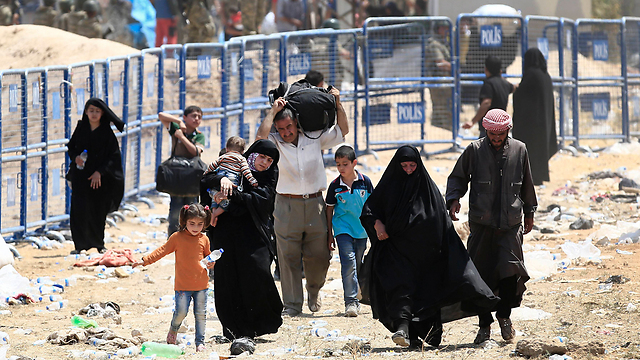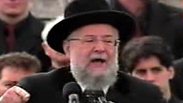
Rabbi Yisrael Lau: Is there anything left of the Jewish state?
As he marks his 80th birthday, Israel’s former chief rabbi is officially retiring after 56 years of activity, including two terms as the Tel Aviv city rabbi. In a special interview, he talks about the Shabbat wars in his city, the Pride Parade, the religionization of the IDF and his memories from Buchenwald, which follow him wherever he goes.
“Twenty-six people were murdered in that attack, including Anatoly and Jana Kushnirov, a couple of new immigrants from Russia,” the rabbi explains at the end of the conversation. “I was Israel’s chief rabbi at the time, and I had a practice of receiving the list of the dead and the addresses of the families, and going to console each and every home. But when the list of bus No. 18 arrived, the Kushnirovs’ address was missing. I was told that the family was not sitting shiva (the week-long mourning period in Judaism) because the only ones left were an eight-year-old boy called Vladik and a one-year-old baby named Tomer. I said I wanted to see them, as I was particularly sensitive to an eight-year-old child. After all, that was my exact age when I was liberated from Buchenwald.
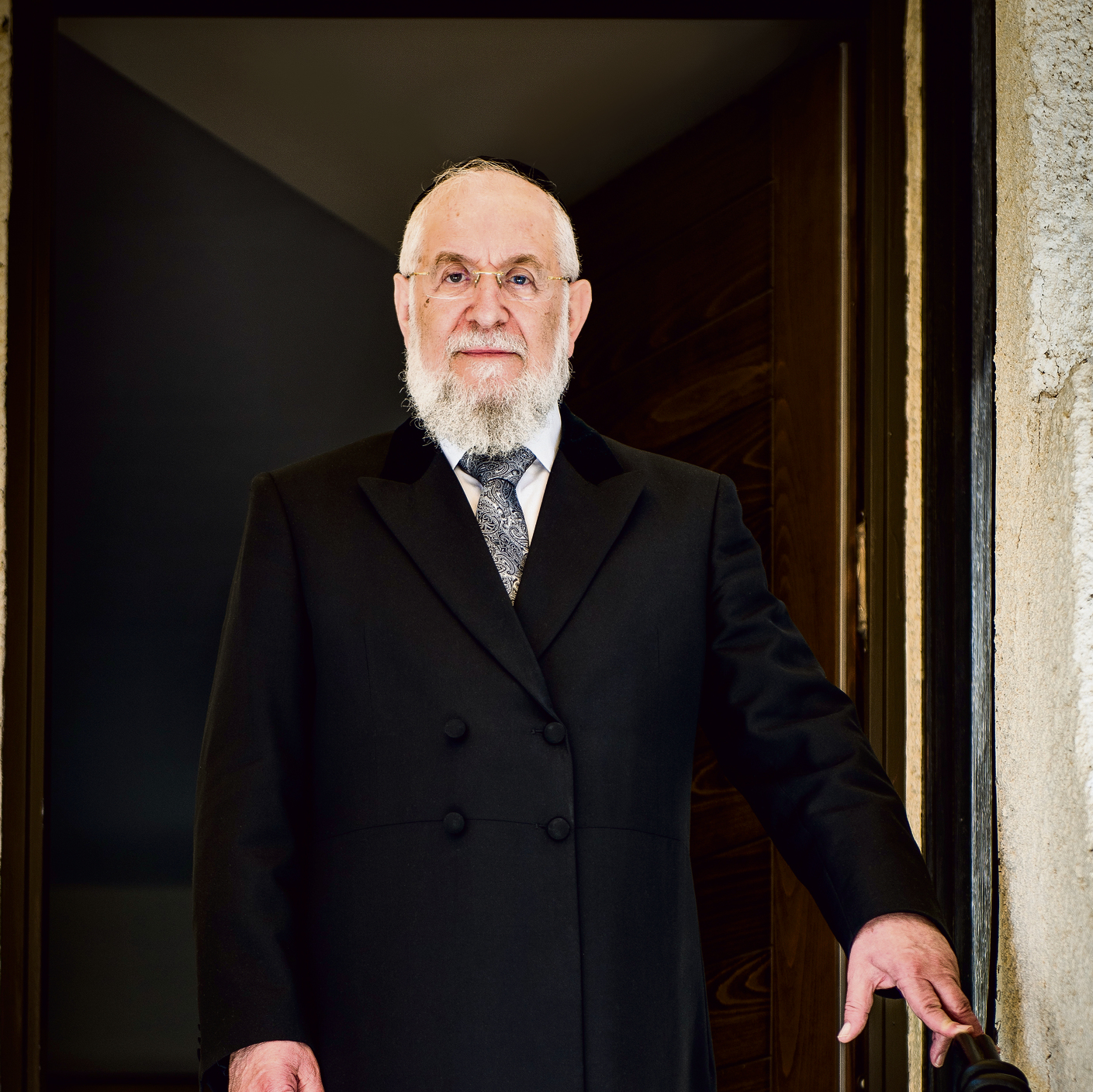
“I got their address in the Katamon neighborhood, and when I arrived, the baby was asleep in the playpen and little Vladik was sitting on the floor, staring at me—the person with the black brimmed who suddenly walked in. His aunt was there, his mother’s sister, Larisa is her name, and she said to him in Russian: ‘Vladik, do you know who the man who came to visit us is? He’s Israel’s chief rabbi. You know, when he was your age he didn’t have a father and mother either, just like you don’t now, and he came to Israel and today he’s the entire country’s rabbi.’ The child looked at me, and I looked at him. And she went on: ‘So you see, Vladik, if you just want to, you’ll have a future and you’ll be a great person. You are not alone.’ It’s one of those moments you don’t forget.
“Several years later, I performed a bar mitzvah for 1,000 orphans at the Western Wall, and someone who got on stage to receive phylacteries from me patted my back and said: ‘I’m Vladik Kushnirov.’ It sent shivers down my spine. And now, after so many years, a phone call.”
Why did he suddenly call?
“He called to tell me he was getting married, and asked if I would be able to perform the ceremony. He said he hoped I was available for him. I said to him, for you I’m always available. We’ll meet under your chuppah before Rosh Hashana and I will say, ‘Tichle shana v'klaloteha, tacheil shana u'birchoteha’ (let the year and its curses end and let a new year and its blessings begin), and there will be a great meaning to it.’”
Keeping the dynasty going
We meet at the rabbi’s home in Tel Aviv. A small neighborhood surrounded by trees, not far from the Kikar Hamedina plaza. He is marking his 80th birthday these days, and last Shabbat his entire family came together to celebrate. The big tribe founded by the little boy from Buchenwald numbers eight children, including Chief Ashkenazi Rabbi David Lau, 60 grandchildren and quite a few great grandchildren. The house can’t contain all of them anymore, so they gathered at a yeshiva in central Israel.
This birthday is particularly significant, as Lau is officially retiring after 56 years of activity, including a decade as Israel’s chief rabbi and two terms as the Tel Aviv city rabbi.
Born to a family that had generated 37 rabbis, he was essentially groomed for the position since childhood. “I wasn’t pressured, but they let me understand that someone had to keep the chain going,” he smiles. “Since the war had taken six years of my brother Naftali’s life, and I was only eight years old and was able to start from scratch, there was an expectation that I would follow in the footsteps of my father (Rabbi Moshe Chaim Lau).”
After immigrating to Israel, at the end of the war, little Yisrael settled at the home of his uncle, Rabbi Mordechai Fogelman, who had escaped the war and became the chief rabbi of Kiryat Motzkin. At the age of eight years and three months, he started the first grade. Five years later, he graduated from elementary school, after skipping a few grades on the way, and began studying in a yeshiva.
“I assume that thanks to my father, who was a famous rabbi, I began receiving matchmaking offers,” he smiles. “I wanted a rabbinical family, and when the daughter of Rabbi Yedidya Frenkel—who served as the rabbi of Florentin at the time—was suggested to me, I entered the family. It encouraged me to keep walking down this path.”
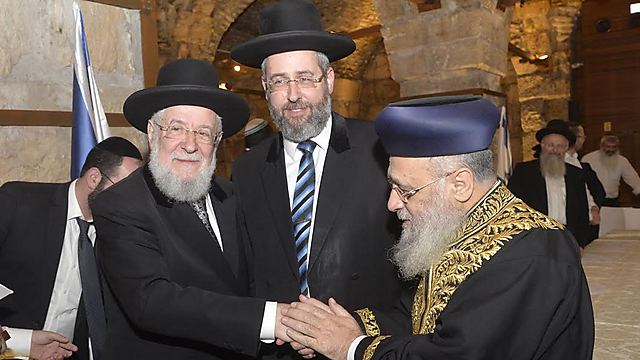
His marriage to Chaya-Ita, who is still his wife today, paved the way for the beginning of his career. His first experience as a rabbi was when his wife’s grandfather fell ill and asked him to replace him as the synagogue rabbi in Florentin. Lau, who worked as a schoolteacher at the time, agreed. At the same time, he began hosting a program called “Kabbalat Shabbat” on Israel Radio on Fridays, in which he discussed the weekly Torah portion and gained a following, which flocked to his lessons devoutly. One of those lessons still takes place today. Later on, he was elected rabbi of north Tel Aviv, then chief rabbi of Netanya, and finally, he replaced his father-in-law as the chief rabbi of Tel Aviv.
You had no choice. You had no room for different dreams.
“I didn’t have different dreams. I had a lot of satisfaction from what I did.”
Did Tel Aviv capture your heart?
“The family captured my heart. My father-in-law captured my heart. I stayed in Tel Aviv also because of my lessons here. And as importantly, the rebbetzin, who is from Tel Aviv. She didn’t see herself living anywhere else. This month, we are celebrating the 58th anniversary of our engagement. From the first moment, we established a connection and an understanding, and within three or four meetings we decided that we wanted to start a family.”
It’s called love at first sight.
“We don’t talk about love in public. It’s personal, but there’s a lot of understanding and appreciation between us and we are raising three generations together. In our house, we never spoke about love and intimate relations. It was unnecessary. My children had a personal example at home.”
Were your children married in a shidduch (arranged marriage) too?
“Yes. With all of them, we had the right to decide on their future. When I met the selected bridegrooms, the first thing I always asked them was if they planned to live in Israel. If not, it was out of the question. With my grandchildren as well, it’s the first condition for a shidduch. I always turned down offers from the Rabbinate offers to work abroad. I left Europe so as not to return.”
And you still support the ‘shidduch’ system.
“I see it as the right way. Young people’s inclinations combined with their parents’ experience is the recipe for success.”
Most young people in your city have other ways of getting together.
“And that reality speaks for itself. Look at what’s happening to the young couples in the city. Believe me, everyone would be better off being married in a shidduch. There wouldn’t be as many divorce cases.”
Treading lightly
He is no stranger to secularism. The lessons he gave as a young rabbi were packed with Tel Aviv residents who were looking for answers. Throughout the years, he hosted prime ministers, mayors and media personalities at his Shabbat table, and in spite of his conservative views, he avoided getting into arguments. Even when our conversation reaches complicated matters, he occasionally says: “I don’t want to be a contrarian. I have been trying my entire life to tread lightly between the different opinions in the Israeli society, and I’m against coercion on both sides.”
Perhaps that’s what allowed you to serve for so long as chief rabbi in such a secular city like Tel Aviv.
“I don’t accept the definition of Tel Aviv as a secular city. There is a discrepancy between its stigma and reality. In 2003, when I returned for a second term in the city after serving as the chief rabbi, I too had a feeling that it was becoming more secular. But I went to the first city council meeting and, to my surprise, eight of the 31 council members were wearing a skullcap. There are 547 synagogues in Tel Aviv. I don’t know if there are any other cities with so many synagogues, apart from Jerusalem and Bnei Brak. So why call it secular?”
Have you checked how many pubs it has?
“I’m not saying there aren’t any cases of secularism in the city. It’s enough to see the Sabbath on certain streets. I’m neither blind nor deaf. It has many religious people too, however. Otherwise, how would you explain the fact that some 970 business owners—of supermarkets, grocery stores, hotels, butcher shops, and so on—seek a kashrut supervisor and a kashrut certificate from the Rabbinate? No one is forcing them to do so, but they understand that without a kashrut certificate and without observing Shabbat, which is a condition for getting the certificate, they will cease to exist. They understand that there is a certain percentage of kashrut observers, and that percentage is their profit. It keeps their head over the water.
“No one writes or talks about this, and about the 547 synagogues and about the Jews marching to prayer twice a day, but all the newspapers write about the Pride Parade which took place here last Friday and which is held once a year, with colorful pictures on the first page.”
So what do you think about the parade?
“It doesn’t belong in the city. Tourists come here from all over the world and it has become part of a big business. Ask the restaurant owners, the hotels—they all make a profit from this business. There are many interests behind the parade, both commercial interests and politicians who take advantage of it. I just don’t know if such a parade solves the problem of people with a certain inclination. What are they solving by raising their problem so high? I can’t see and can’t understand how the publicity helps solve the problem. If there’s a person who has a personal problem, does he help solve it by dancing on a truck on the city’s streets in the middle of the day? Does it belong in the street? Does it belong in front of the microphones and the cameras? I don’t understand it. But we have gotten used to it. We experience it year after year.”
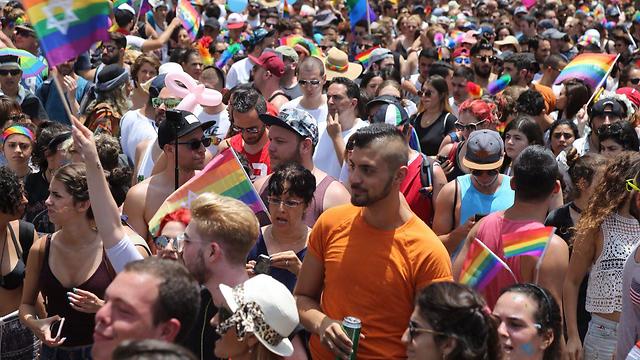
Why are you calling it a problem?
"Because it’s a problem a person has. It’s not what I think. It’s what they themselves think. Otherwise, why would they be dancing on the street? What is the parade about? If there’s no problem, how are they different? What’s all the noise for? This parade doesn’t solve these people’s problem, the issue of how to have children, how to start a family.”
Rabbi Shlomo Aviner is in favor of referring gay people to conversion therapy.
“I don’t really know what that is and I don’t deal with issues I know nothing about. If a couple from the community had approached me for marriage purposes, I would have had to deal with the problem. But I have never been approached and haven’t been forced to deal with it, thank God. Preventing that or the parade is not in my hands, so I don’t delve into it.”
‘We have become the people of commerce’
There seems to be only one thing overclouding Rabbi Lau’s retirement: The battle around the opening of businesses on Shabbat. The High Court ruled in April that the Tel Aviv Municipality would be able to allow business to remain open on Shabbat, but Interior Minister Aryeh Deri sent a letter to the attorney general and requested another discussion by an extended panel, so the battle is not over yet. If it weren’t for this issue, the rabbi admits, he would have been retiring with greater satisfaction.
“At the end of the day, what lies behind the opening of supermarkets on Shabbat? Greed. A few supermarket owners who are chasing money,” he says. The People of the Book have become the people of commerce, who are running after every penny their entire life. Will anything happen if you let go of the money for just one day a week, be with your family, open a book? Will people die of hunger without the Tiv Taam (non-kosher supermarket chain) pork?”
But why not allow me, as a secular, to celebrate Shabbat my way, including buying a product I may have suddenly run out of?
“Because there are limits in life. Does the security guard have to work and does the porter have to work and does the cleaner have to work and does the saleswoman have to work, just because you are missing a certain spice for your casserole and you want to buy it on Saturday morning, simply because you feel like it? So wait with that spice for a day or make sure to buy it during the week. I heard the deputy mayor say that he wanted his residents to have a fresh glass of milk on Shabbat. Are there no refrigerators in Tel Aviv anymore? Are there no open restaurants, are there no hotels? They are all open.
“We’re talking about all people, not about the individual. No one says anything to a person who waters the flowers in his garden on Shabbat. A person who turns on the television on Shabbat or cooks for himself can do whatever he wants. I’m talking about public affairs, and there’s a social issue here too.”
Please explain.
“Think about what it does to the employees’ families. Friday afternoon arrives, and a child comes home to be with his family till Sunday morning. But when the parents work, the children are left alone. And I’m talking about the lower classes. The mother is a cashier and the father is a security guard. Because someone has to buy a bottle of milk for himself, the child comes home and has no father and no mother on Shabbat.”
But stores have been open in Tel Aviv for years. Why rehash the issue?
“There are other things going on in the city which are unacceptable as far as the state law is concerned, yet it would never occur to anyone to say that since it already exists we should officially allow it. After all, there is human trafficking, and the Tel Aviv Police are aware of the problem and it’s being done within the city. So what? Will the Tel Aviv Municipality say one day that because trafficking of women exists, it should simply be permitted? Would anyone dare say something like that? Of course not. Only when it comes to religious issues, everything is permitted.
“What we are seeing is a decades-long educational failure, which stops people from understanding the essence and value of Shabbat and what they are missing out on. I keep asking myself: It’s a Jewish state after all. What is left of it? People are married by an entertainer, they are buried in a kibbutz which is commercializing the whole thing, they open stores on Shabbat, and it’s all okay. So what is left of the Jew here?”
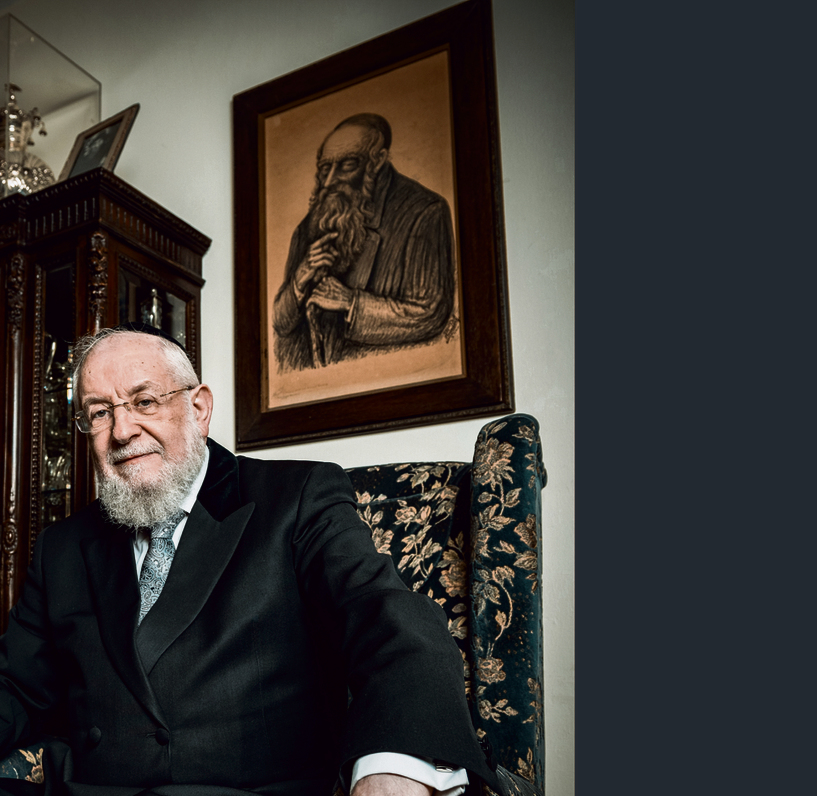
As a secular, I feel differently. The way I see it, the Rabbinate has a monopoly over life, over marriage, over divorce, over kashrut. Many people feel that it’s an inflated establishment with a lot of irregularities, which is raising the cost of living.
“This perception, that where there are religious people there is money, is almost anti-Semitic. I served as the Netanya city rabbi for nine years of my life. There were 32 hotels there. It created a major headache in terms of kashrut. Everything was open on Shabbat, on Passover. And the salary I received was similar to the salary of the Hadera or Petah Tikva rabbi. They had no hotels in their cities. Why am I telling you this? Because when I say that something is kosher or non-kosher, it doesn’t change my financial situation one bit. There are factories in this city, butcher shops, restaurants, and when I permit people to eat or buy meat in a certain place, there are no ulterior motives.
“But as soon as the kashrut system is privatized, as soon as it is taken out of the Chief Rabbinate’s hands, the kashrut level will go down. Different rabbis will show up, and each one will try to be more convenient for his potential clients. The message will be: You should take your certificate from me, because I won’t demand much of you. I am against the kashrut supervisor receiving his salary from the business over. There should be a separation between the supervisor and the supervised.”
Quite a few rabbis have been convicted of corruption and immoral acts—Yona Metzger, Yoshiyahu Pinto, Mordechai Elon.
“What happened to the religious public happened to the entire Israeli society. The religious public doesn’t live on a different planet. They live in this society, and everything has changed. The corruption outside has somewhat penetrated the religious leadership as well.”
You were also against importing non-kosher meat. Why do you care what I have on my plate?
“We don’t interfere in private affairs. There are private restaurants, there are people who take kosher meat and mix it with cheese, and we don’t do anything about it. No one is interfering in your plate, but this is about the State of Israel importing meat.
“I remember the time a certain company was permitted to import non-kosher frozen meat. I was the chief rabbi back then and I discussed the matter with Yitzhak Rabin, who was prime minister. Eventually, he passed a law against it. When he called to inform me that the matter had been taken care of, I was moved. I asked him, ‘Mr. Prime Minister, why did you do it? You have no religious partners in your coalition.’ And he replied, ‘I did it for two reasons. First of all, we have enough non-kosher food here, there is no need to import more. And second, we are a Jewish state after all.”
Sometimes I think that the hidden and open pressure on seculars to get closer to religion is actually driving them away.
“I don’t believe that’s what drives them away. What drives them away is the Americanization, in many areas. We are importers of a foreign culture. Do you think that when an actor and an entertainer and a singer and a model perform a wedding ceremony, it’s more a dramatic and personal experience than a Jewish wedding? What I see in this phenomenon is that one person follows in the other person’s footsteps. And it’s also as if they’re protesting against the past, against the establishment. But who are they rebelling against? Did I force them to break a glass? They break a glass too, by the way. The only difference is that there the girl breaks the glass too. Big deal. They created equality, feminism, so the bride breaks the glass too. So I’m asking you, is this what I’ve been waiting for? And as for the religionization in education, it’s good to return to a Jewish perception. Young people don’t know enough.”
So they can study that in religion classes. Why should they study the prayer for rain in geography class or Tefilat Haderech (the traveler’s prayer) in road safety class?
“Is there anything wrong with an Israeli teenager knowing that there is a prayer for rain or being introduced to Tefilat Haderech? Showing some Judaism to all parts of the population is something I welcome.”
The budgets allotted to the expansion of Judaism studies come at the expense of budgets for sciences or for art.
“Has anyone asked me what I think about things that cost money here that I’m not comfortable with? When the municipality decides that the Pride Parade costs a certain sum, that the Pride Month with raised flags costs a certain some, that a bicycle path costs a certain sum—do I ask why budgets are being allotted to those purposes? No. But as soon as the budget goes to something religious, you immediately start shouting that it costs money.
“Personally, I find Judaism studies more important than math studies, but I accept that for someone else, who wants to be an engineer, math is more important. For me, Judaism is the basis and we have no right to exist without it, but when I arrived in Tel Aviv as a yeshiva graduate, I has no matriculation certificate. I taught Bible lessons at the Ankori high school, and in return I studied mathematics and English and completed my matriculation exams. There is no contradiction: You can be an excellent doctor and also know that there is a prayer for rain once a year.”
Perfect faith
A matriculation certificate was not the only thing he accomplished when he arrived in Tel Aviv. He also joined the army and served for 25 years in the Chief Rabbinate’s lecturers unit. His three sons served in the army as well, but his five daughters didn’t.
Do you believe that had your daughters gone to the army, it would have corrupted them?
“They wouldn’t have gone. Since the state’s establishment, rabbis have been against the enlistment of women, and it was enforced by law. They do their service in a different way.”
What is your opinion on female soldiers singing in the IDF, and on women’s singing in general? If a woman sings at a ceremony, do you get up and leave?
“Look, I sat at the Holocaust memorial ceremony at Yad Vashem when a woman sang, and I stayed during the ceremony, and in Memorial Day ceremonies there is sometimes a female singer and I don’t go out. I sit there and I hear it. I can think about whatever I want while she sings. I don’t have to focus on her singing. But I won’t get up and leave. Leaving is a protest, and I won’t protest.
“One thing I could do is ask for consideration when there are less religious and more religious parents in a certain ceremony. There is room for consideration, but women’s singing does not determines our life. Moses already detected that we are a people with all kinds of elements that have to be tolerated. We need a lot of tolerance, and we need tolerance towards everyone.”
How do you feel when soldiers are beaten up in Bnei Brak and Jerusalem, or when a soldier effigy is burnt?
“It’s dreadful. It rips my heart out. This attitude towards soldiers is a wound and an unforgivable crime. These are people who do not represent the entire Haredi public, and I wouldn’t regret seeing one of two of them being prosecuted, as a lesson for all to see. The threats against the head of the IDF Manpower Directorate, Moti Almoz, are a terrible thing too. It’s anarchistic. They can sign a petition, engage in lobbying—but what is this violent behavior on the streets?”
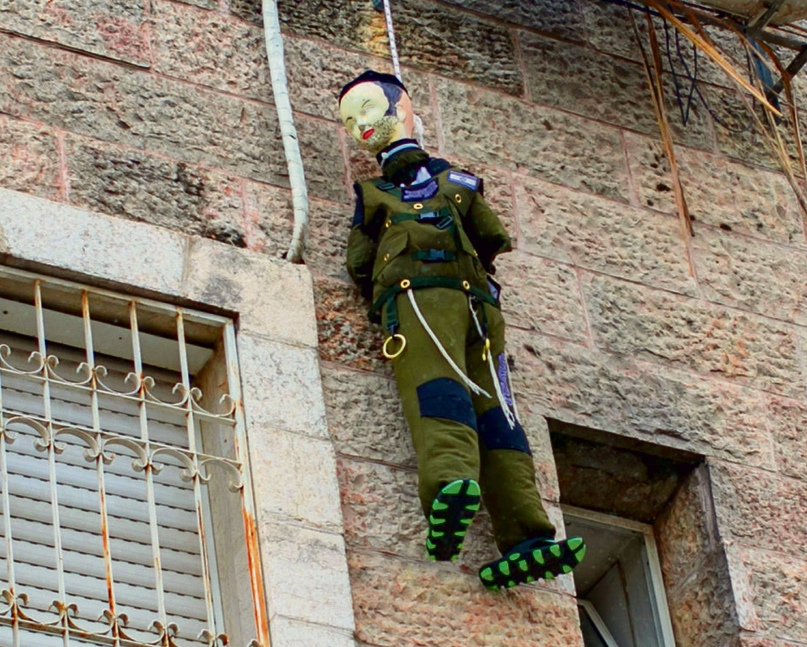
There is religionization in the army as well today. Soldiers are offered to put on tefillin before leaving for battle, to participate in a prayer.
“There are more religious people in the army today, and the Haredim have begun enlisting too, and I think it’s having an effect. If you ask me, they actually took a lot of authorities from the Military Rabbinate recently and handed them over to the chief education officer. But why this fear of religion? I don’t see anything negative in a Jewish soldier being offered to put on tefillin before a battle.”
What would you tell soldiers—for example, in the Amona affair—when they receive one order from their commanders and another order from rabbis?
“If such a soldier approached me, I would say to him: Listen, don’t launch protests, don’t incite your friends. Talk about it graciously. If you’re having trouble obeying an order or evacuating a settlement, go to your direct commander and share it with him. Tell him candidly, ‘I can’t. I can’t expel my own mother, I can’t evacuate a community my friend lives in. You know that I’m a devoted and loyal soldier and that I do everything. Let me go. Don’t make me do it.’ It can be solved. If the commander is tough, go to the one above him. You may even reach the regiment commander. I don’t believe they won’t understand you.
“But if they don’t accept what you say, you must obey the order. We can’t have four soldiers in a tank with each of them pulling in a different direction. We’ll be like the phalanges in Lebanon. Insubordination is a mistake. As chief rabbi, I was against this disobedience.”
There is a feeling that Religious Zionism is growing stronger, in the army too.
“It’s true that things used to be more mixed in Bnei Akiva, and now they’re more separate. In the state religious education, certain things are definitely being reinforced, there is more separation between boys and girls, an emphasis on large skullcaps. I see an analogy in all of this to the situation in the secular world.”
Please explain.
“The non-religious environment has changed unrecognizably in recent years. The cinema has changed. Even the newspaper has changed. In the past, the words rape and suicide were not mentioned in the press. The street has largely been breached. You see the ads on the bus stops today, on the Ayalon Freeway, pictures the size of a tower which you wouldn’t see 50 years ago. So naturally, when a father wants to educate his sons and daughters in a religious atmosphere, he has to raise the barriers. The religious society seems to increasingly shutting itself off. There is a separation process.
“But the secular public has become radicalized too. Look at the new culture heroes. A singer comes to Yarkon Park, and 30,000 teenagers start running around and screaming as if they were in the safari! Even in the safari you don’t hear anything like the screams of those 14-year-old girls in light of one Justin Bieber.”
At the same time, the Israeli youth is shifting to the right and moving closer to religion. Will my grandchildren have to cover their heads?
“Society is moving in a more religious direction, because religious families have more children. It’s a natural process, and it might have happened faster it if were not for the waves of immigration from the Soviet Union, and it will keep happening if there is no massive aliyah from the United States.
“As for your grandchildren, I don’t think they will have to. I would like to believe that they would want to, that it would be the atmosphere. I see a strong desire to learn among secular youth. It isn’t translated into a religious lifestyle, into becoming religious, but it is translated into a desire to know more. I feel it everywhere. It’s not an awakening campaign organized by the Military Rabbinate. It’s coming from the bottom.
“It’s affected by the political situation too. When the coalition is based on foundations of so many Knesset members, from the Bayit Yehudi party, from Shas, from United Torah Judaism, and they assume positions like in the Education Ministry, it has an effect. It penetrates.”
So will we end up living in a halachic state?
“I don’t see it in the horizon, but I would like to ease your fears: You won’t have to go into a bomb shelter when it happens. In the meantime, I am more concerned about the influence of foreign cultures.”
Would you like to see the Third Temple being built in the near future?
“I would like to believe that it will happen in the near future. The song ‘Ani ma'amin b'emunah sh'leimah b'viat hamashiach’ (I believe in perfect faith in the arrival of the messiah’) was sung by Jews in their final moments, on the train to Treblinka.”
‘I hate the word farewell’
I ask the rabbi what it feels like to bid farewell to his position after so many years. “The truth is I feel a bit liberated,” he says candidly, “because the responsibility for matters like marriage and kashrut in a big city like Tel Aviv-Jaffa is huge. But I’m leaving with the knowledge that I will remain active on all the spiritual issues to the same extent, and maybe even more.“I do have a request,” he adds. “Don’t use the word farewell. I almost hate that word. I never use it.”
Why not?
“Forgive me for taking you back to when I was eight years old in Buchenwald, but there was a certain moment which shaped my entire life. We didn’t know at the time that it was the last year of the war, and we were very depressed. I was among Russian hostages in Block No. 8, near the camp’s gate. My brother, Naftali, who saved me when my mother threw me at him in an instant before getting on the train, and who brought me into the camp inside a sack, was in Block No. 59, among Jewish prisoners, and we didn’t see each other.
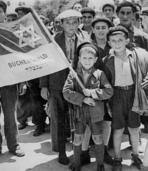
“One day I was inside the block, and I heard my brother calling me from the yard beyond the fence. At first, I didn’t recognize him. He was skin and bones, with serious typhus, and he said to me: ‘Lolek, it’s good to see you. You’re a big boy now and I can talk to you straightforwardly. You know that we have no father, and mother is probably no longer alive either, and they are now taking me too and I have come to bid farewell. If you stay alive, you’ll have no home to return to. Just remember one thing: There is a place in the world called the Land of Israel. It’s our home. If they try to take you here or there, say: Only the Land of Israel. They don’t kill Jews there and you have an uncle there, Rabbi Fogelman. Just say your name, that you’re Lolek Yisrael Lau, and he will find you.’
“And then Naftali moved away, and to this very day I can’t shake off that feeling of saying goodbye. Even after 72 years and after writing the book (‘Do Not Raise Your Hand Against the Boy’), which I thought would set me free.”
Even though Naftali survived?
“Yes. He jumped off the train that took him and crawled back to Buchenwald, because he had a brother and he had promised the parents that he would take care of him. But this experience of bidding farewell is still hanging in the air. Naftali died two and a half years ago, and every year, on April 11, he would call and we would congratulate each other on our birthday, because that was the day that General Patton liberated Buchenwald. It’s as if we were both born on that day.
It seems that 72 years after the horror, the small child from Buchenwald is still present at the end of each of Rabbi Lau’s sentences. The memory of the Holocaust follows him wherever he goes. I ask him about the situation in Syria, about the world’s silence, about our silence.
“I’m ashamed of this silence,” he says. “We must set off all possible alarm bells. I call on the Knesset speaker to urgently convene a special meeting on the holocaust in Syria and to announce that we are a nation who knows what it’s about more than any other nation. We know the meaning of a massacre against children, with chemical means, and we must shake up the global public opinion in every possible way. If we fail to do so, history won’t forgive us. We rightfully condemn those who were silent when we were bleeding, and that’s what we’re doing now with Syria. We can’t say that we didn’t see what is happening. Our voice should echo in the world, and we haven’t done that. We have forgotten to see what is taking place around us and we are only focused on our own problems.”
On the personal level, do you think that anything can be done?
“I would adopt a Syrian child if I could help him. I would open my home to him, and I wouldn’t expect (Syrian President Bashar) Assad to award me a Righteous Among the Nations title for it.”











